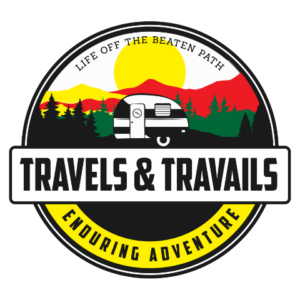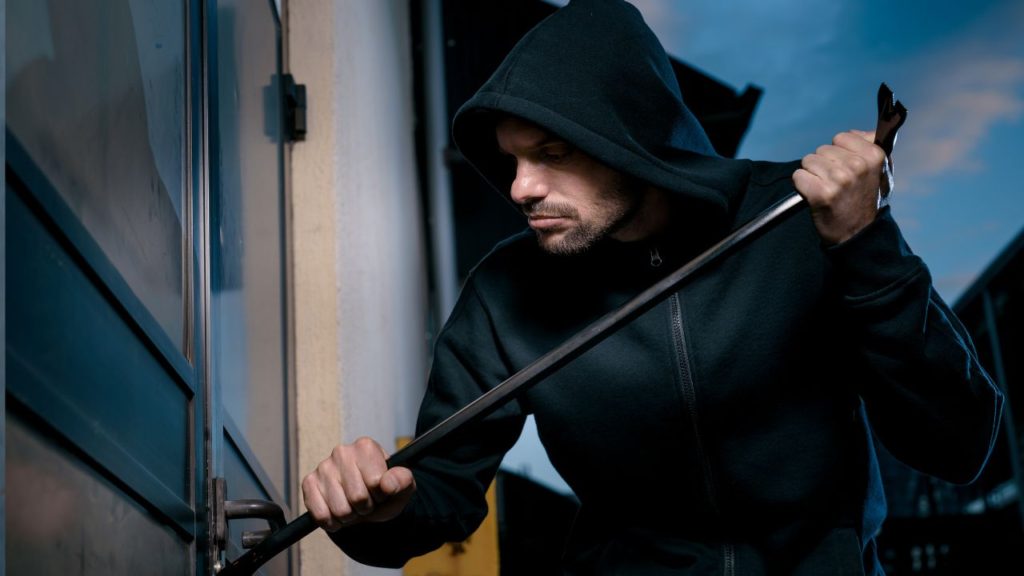
Most people think of an RV as their second home. Like a home, an RV is a considerable investment. When you invest that much money, you’re likely asking yourself, “How do I keep my RV from being stolen?”
Here are some suggestions from RV owners on ways to keep your trailer from theft:
- Park in a secure location
- Limit access by pinning RV behind another vehicle or object
- Add exterior locks
- Chain RV to object
- Remove wheels and tires
- Use motion lights
- Install alarm systems
- Purchase a tracking device
- Install outdoor cameras
How RVs are Stolen
There are many ways that RVs are stolen. Travel trailers are the most likely to be stolen followed by motor homes and 5th wheel trailers. Read on to find out how RVs are stolen.
Travel Trailers
Travel trailers are the easiest RV to steal. Once the 7-pin connector is attached, the electric tongue jack is energized. Now all the thief needs to do is lower the hitch on to the ball of their tow vehicle. After that, they’re off – with your trailer.
You might think that a ball hitch lock would save your trailer from being stolen. While they help, they aren’t fool-proof. Many trailers are stolen when the thief attaches the trailer safety chains to their own tow vehicle. Then, they drive off with your trailer.
Motor Homes
While motor homes are less likely than travel trailers to be stolen, theft still happens. Motor homes are stolen in the same ways that cars are stolen. If you have key-less entry and ignition on your motor home or camper van, there are ways that thieves can bypass or mimic your entry codes.
Thieves can steal your code with a device that reads the code from your key fob. In order to do this, they need to be in proximity to the RV. If you have an older, keyed RV, the RV can be hot-wired.
5th Wheel Trailers
5th wheel trailers are more difficult to steal because the thief must have truck with a 5th wheel hitch. That’s not to say that it doesn’t happen. 5th wheel trailers are stolen when the thief simply backs up to the trailer and attaches it to the trailer hitch on their truck.
Read on to find out how to keep your RV secure.
Park in a Secure Location
The most important thing you can do is park in a secure location. If you are lucky enough to keep your RV at home, the most secure place is in your garage. Unfortunately, there aren’t many RVs that will fit in a standard garage. There also aren’t many garages that are large enough to fit an RV.
Your second best option is to store your RV behind a locked gate at your home. Thieves are more wary about stealing from an occupied dwelling than from an unoccupied and unsecured location.
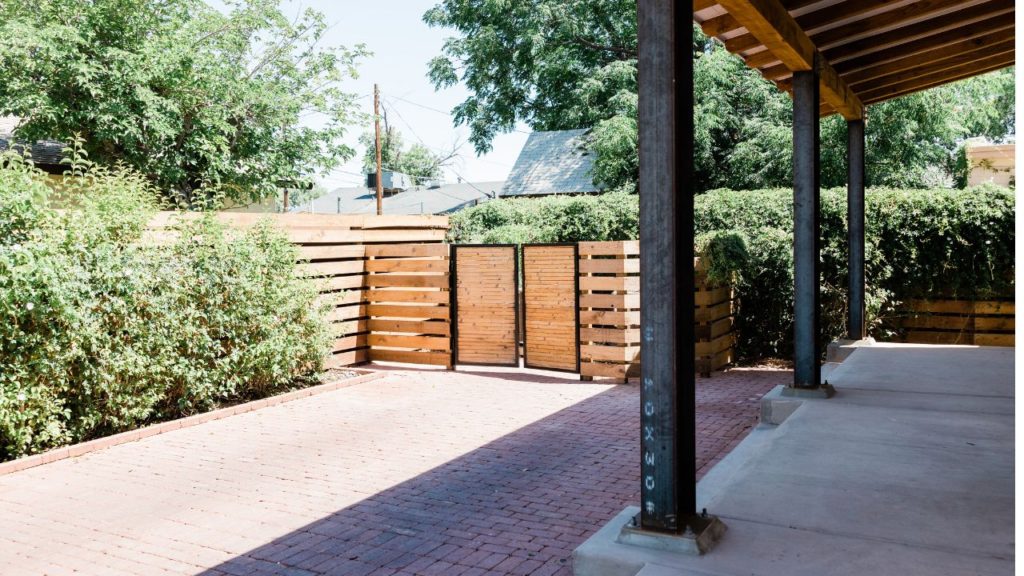
Not everyone has the space to store their RV at their home. If you can’t store it at home, then your best bet is to store your RV at a secure off-site location. There are some considerations when storing your RV away from your home. First, find a location with a locked gate. Next, store it in a location where people frequent.
RVs are rarely ever stolen from campgrounds because a thief would be easily noticed by your camping neighbors.
Store your RV in a place that is well-lit at night. Bright lights can be a deterrent to criminals who want to go undetected.
In addition to the items I mentioned, RV storage facilities also have cameras and electronic gate access. But RV storage facilities are a target rich environment. There are many videos on YouTube of RVs being stolen out of the storage facility. Read on to find additional tips for securing your RV when at a storage facility.
Limit Access by Pinning RV Behind Another Vehicle or Object
A car makes a great barrier between your RV and a thief. And, as I mentioned above, a gate makes a great barricade. Pinning your RV behind another vehicle is not foolproof, but is another added deterrent.
Add Exterior Locks
As I mentioned, it’s important to add some security measures whenever you store your RV. Exterior locks are another deterrent to theft. There are several types of exterior locks.
Wheel Locks

There are two different kinds of wheel locks. One is a wheel chock lock. This lock immobilizes the wheel so that it won’t turn. We have the Trimax Wheel Chock Lock. We often camp in remote locations, so it’s good to have some extra protection for our travel trailer. The wheel chock lock is a deterrent, but what if the thief simply removes the wheel and puts on a different one? That’s where wheel locks come into play. If you replace your lug bolts with locks, it will make it more difficult for a criminal to remove your wheel. But don’t ever lose the key… If you lose the key to your wheel locks, you won’t be able to change the tire.
Coupler and Safety Chain Locks
A coupler lock is another type of theft deterrent for travel trailers. This item fits in the location where the ball of your trailer fits in the coupler. We have an inexpensive coupler lock. If you watched the video above, you saw that thieves can still steal a travel trailer with this type of coupler lock.
With some additional cash, you can purchase a coupler lock that also secures the safety chains to prevent the type of theft that happened in the video.
The best one is a puck lock, the Proven Industries lock. With this puck lock, both the ball and the ends of the chain are secured inside the locking mechanism. Plus the round key style makes the lock more difficult to pick. It’s definitely pricey, but less expensive than replacing your trailer.
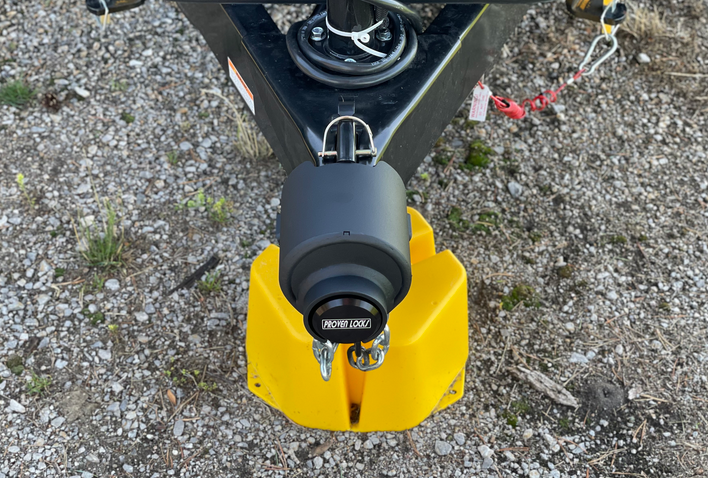
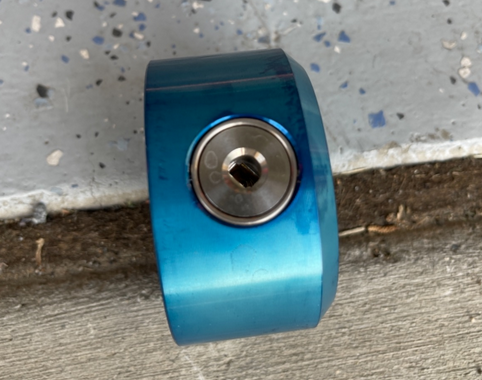
Both types of locks can come in different sizes based upon the ball size, so be sure to get the one that fits.
King Pin Lock
If you own a 5th wheel trailer, you can purchase a king pin lock. The top two are the Road Pro and the Trimax king pin locks. These locks cover the king pin so that the trailer cannot be hitched to a vehicle.
Receiver Pin Lock
You can also purchase a lock for your receiver. This lock prevents theft of the ball mount. This is important because, without it, a criminal can disconnect the ball mount when the trailer is hitched to your vehicle and steal it right out from under you.
If you purchase the coupler lock and the receiver pin lock as a set, you’ll only have one key to deal with.
Steering Wheel Lock
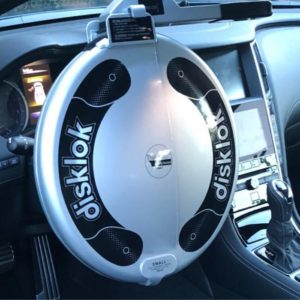
If you own a motor home or campervan, consider a steering wheel lock. The best type of steering wheel locks cover the whole steering wheel. An example of this is the Disk Lock. As you would imagine, this is one of the most expensive steering wheel locks on the market, but is most effective.
The Disk Lock clips over the steering wheel so it completely covers the steering wheel. It’s heavy, but made of sturdy galvanized steel. The Disk Lock comes in three sizes, so it’s important to know which size steering wheel your motor home or camper van has.
Since it’s so visible, the Disk Lock also acts as a deterrent. However, the Disk Lock is not foolproof. I watched a video where a guy was able to get this wheel lock off in 3 minutes 32 seconds by using a grinder.
Another common style of lock is a bar lock. Bar locks are easier to remove than a lock that covers the whole wheel. With a bar lock, the thief can simply cut through your steering wheel to get the lock off. This takes about 8 seconds with a hand saw.
A better option is a steering wheel and brake lock. These devices immobilize both your steering wheel and brake at the same time.
Chain RV to Object
If possible, chain your RV to a stationary object with a heavy duty security chain. The best options for stationary objects are concrete or metal. Even a large tree would make a good stationary object.
You can also place the chain through the wheel and the suspension. As long as the chair remains in tact, the RV will be immobilized.
There are trade-offs with security chains. The thicker the chain, the longer it takes to cut. On the flip side, thicker chains are heavier and more expensive.
The thickest chains on the market are the Titan 22mm high security chain and the Squire Stronghold Sold Secure Diamond Chain 22mm. Neither of these chains are very long and they are both around $350-$400.
So what is a good option that is reasonably secure, doesn’t cost a fortune, and is long enough for your needs? We bought the ABUS Hardened Steel 8KS.
We also have a disk lock right now. We also have the ABUS 20/70 Diskus Stainless Steel Padlock. Disk locks are difficult to break with bolt cutters.
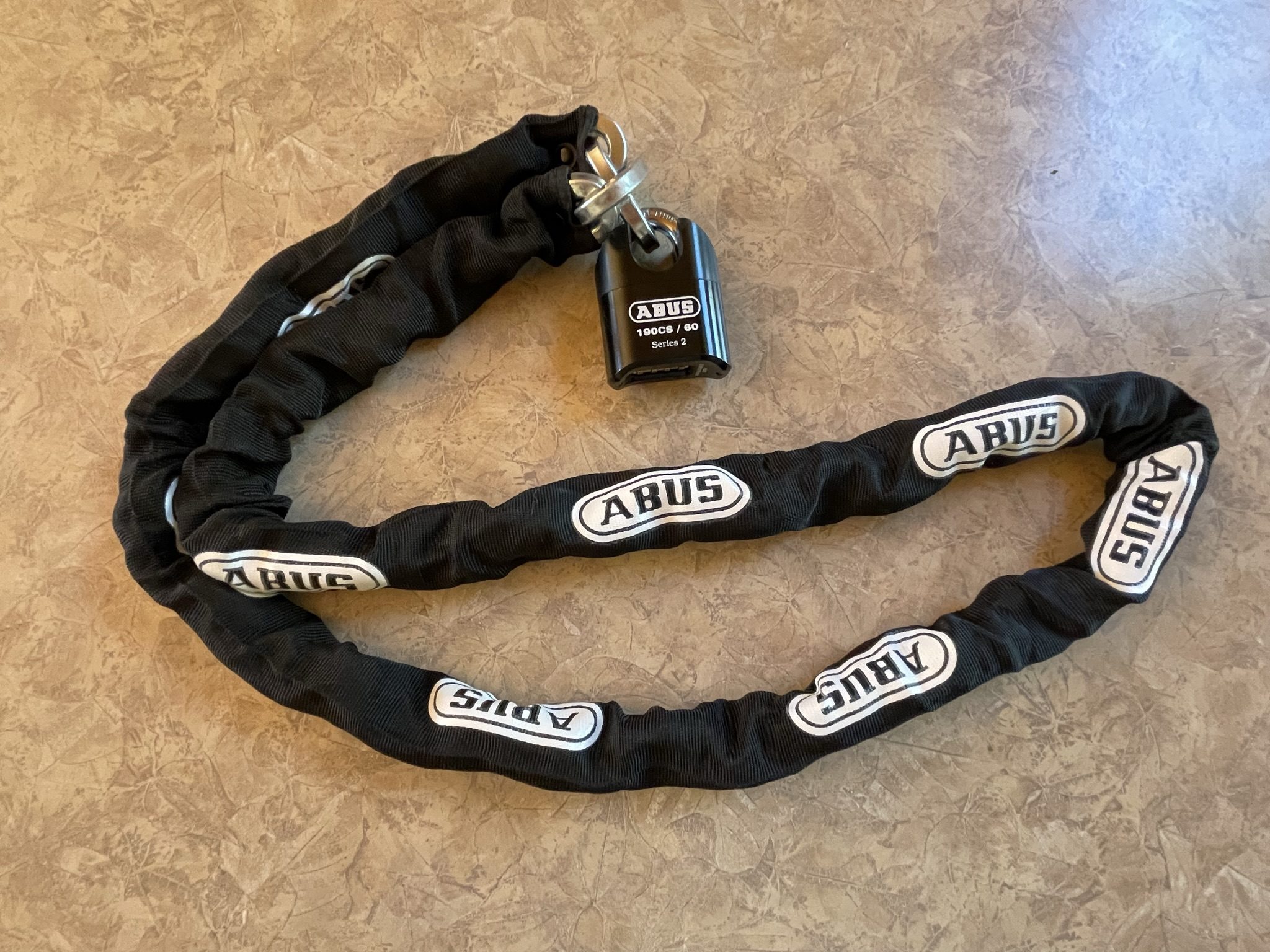
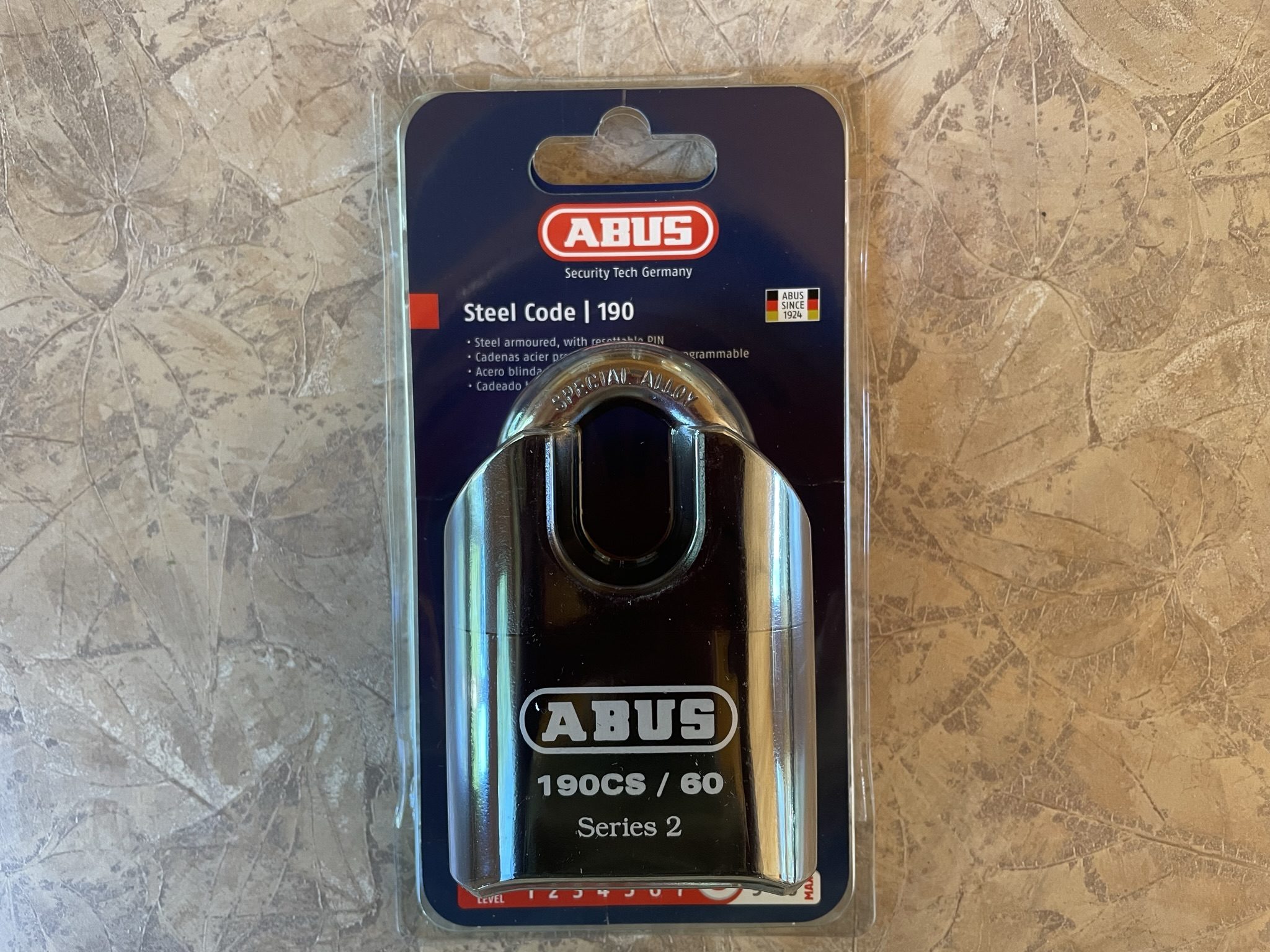
You can, however, drill these types of locks out and get them open, but it takes a while. Nothing is foolproof.
Chain Seats Backward
Some motor home and camper vans come with seats that turn all the way around to face the back of the vehicle. If you have these types of seats, you can chain the driver’s seat to the rear facing position. In order for the vehicle to be stolen, the thief would have to break the lock and return the seat to it’s forward facing position.
I saw one situation where the motor home owner drilled a hole in the seat mechanism and added a Uolor Alarm Disc Lock. This lock emits a high-pitched alarm when tampered with. It also immobilized the seat.
Remove Wheels and Tires
Some RVers remove the wheel and tire from their RV. This is an effective theft deterrent if you are storing your RV but would be very inconvenient when you are using your RV. A thief would really have to plan ahead and be ready with the appropriate sized wheel and tire to steal your RV.
Use Motion Lights
Motion lights provide both safety and security to your RV. When your RV is stored, they are more of a deterrent. But when you are using the RV they provide safety and security.
Install Alarm Systems
While Alarm systems can enhance the security of your trailer. For the piece of mind you get, they are relatively inexpensive. Plus, they have the bonus of providing an extra layer of safety when the trailer is occupied
One of the better known systems is the Ring Alarm System. These systems were originally designed for homes. Now, they can be easily adapted for RV use.
Tracking Devices
For most RV owners, a tracking device is an inexpensive, simple, piece of equipment that will give you peace of mind. If someone steals your RV, you’ll have a means to track it down.
How Tracking Devices Work
Our dog wears a Fi collar, which is a GPS tracking device. This collar tells us her location within a seven foot radius. It also alerts us in the event that she goes outside a given radius. In our case, outside of our yard. An RV GPS tracking device is similar to our dog’s tracking collar.
Like the Fi collar, some RV GPS tracking systems charge for the equipment as well as a monthly fee. For example, the Trak-4 GPS Tracker costs around $50. If you choose the annual fee, it’s $7.00 per month. If you choose the monthly fee, it’s $13.00 per month.
A few owners in an RV Facebook group like the Trak-4. The device looks like a simple box with no markings. That way, a thief will not be able to identify it as a tracking device.
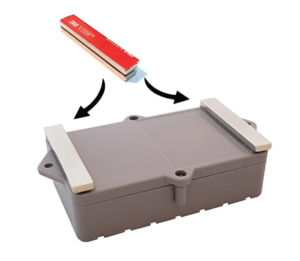
The device works by sending location information to a database. You can access the online location information from your phone, computer, or tablet. You can also set up a “Geo-fence.” That way, you’ll get a notification if your camper moves.
Learn About RV Tracking Devices in Ten Minutes.
Tracking Device Downsides
There are some downsides to tracking devices. Tracking devices do require power. Many can be set up using 12-volt power from your RV battery. So if your battery loses power, you’ll lose your ability to track your RV.
Another disadvantage to tracking devices is that the signal cannot transmit through some buildings. This is true for concrete buildings. In this case, thieves can simply move your RV into a concrete building an it will go undetected.
Install Outdoor Cameras
Like alarm systems, outdoor camera systems function as both a safety and a security systems. If you already have the Ring Alarm System, you can add cameras to it.
If you are interested in something else, the Blink Outdoor Wireless Security Camera is popular in the RV community.
With most of these systems, you can get motion detection alerts on your phone. With the Ring system, you can set a perimeter for the motion detection system. The advantage to this is that you can exclude areas where people might be walking close to your campsite. That way, you hone in on the areas that are particularly vulnerable like to doors and windows.
Conclusion
While there is no guarantee that your RV will not be stolen, there are many things that you can do to make it difficult or less desirable for a thief to steal.
